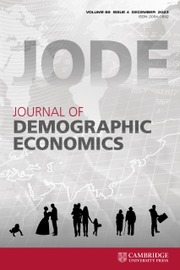Article contents
GARY BECKER’S CONTRIBUTIONS TO THE ANALYSIS OF DISCRIMINATION
Published online by Cambridge University Press: 24 March 2015
Extract
Becker analyzes racial discrimination given its existence; as we know from his 1977 paper with George Stigler, “De Gustibus Non Est Disputandum,” Becker felt that the determination of preferences was to be taken as given, at least from the standpoint of conducting neoclassical economic analysis. One of the ingredients of this research is the distribution of racial animus in the populations of employers, employees, and customers. The most interesting and memorable feature of the analysis is the examination of equilibrium racial wage and employment outcomes when there are “tastes” for discrimination of various kinds and labor and product markets vary in their degree of competitiveness.
- Type
- Special Section: Essays in honor of Gary Becker
- Information
- Copyright
- Copyright © Université catholique de Louvain 2015
References
REFERENCES
- 4
- Cited by




